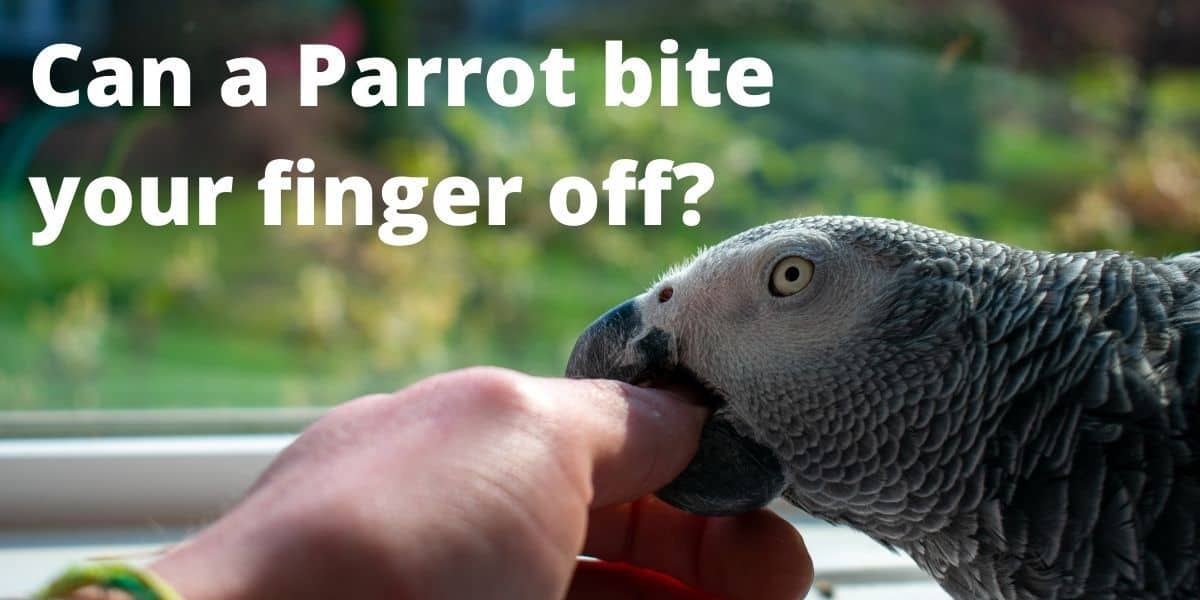Losing a finger to a parrot bite is just about as harrowing as it can get and if you own or interact with parrots you need to be on your guard.
A parrot’s beak is powerful and capable of inflicting a nasty bite. Remember the same jaws can crush large tropical nuts with a powerful bite pressure of 300 to up to 1000 pounds per square inch depending on breed. The bite force of larger parrot breeds is more than capable of biting a finger clean off!
Table of Contents
Parrot breeds that can bite off a finger.
When considering the types of parrots that could bite your finger off, Macaws and Cockatoos immediately spring to mind. These parrots have powerful jaws and sometimes the inclination and speed to take a hold of an extended hand and not let go.
Most injuries sustained by these parrots will not directly amputate a digit but the larger parrot species like the Hyacinth Macaw and Black Palm Cockatoo are more than capable of delivering this level of force.
For example, the Hyacinth Macaw can bite through a broom handle. Look at how this Hyacinth tears a tree branch to pieces:
But even if you don’t lose a finger, a parrot bite can do some serious damage.
A bite injury to the hand from a parrot is serious!
Medical experts are increasingly encountering parrot bites as exotic pets like parrots become more common. Bite injuries to the fingers and hands from exotic pets like parrots can be severe, leading to fractures and even amputation of an affected digit.
A UK case study published in the medical journal HAND highlighted the seriousness and risks that come with a parrot bite.
The case focused on the emergency room presentation of a British 17-year-old who had been bitten by a friend’s parrot while petting it. He reported that the parrot clamped down on his left index finger fully for a few seconds before letting it go.
Medical examination and X-rays found that he had sustained an open phalangeal fracture, a serious type of fracture where the broken bone pierces or is exposed through the skin.
Not only did the young man require an extensive surgical debridement (clean-up) of the wound and stabilization and splinting of the fracture, he also needed to take an array of powerful broad-spectrum antibiotics to deal with the germs that can be potentially transmitted by a parrot bite.
A parrot bite is a dirty bite.
You absolutely do not want to encounter any of the germs carried in parrot saliva which include germs that can cause serious infections like:
- Psittacosis or parrot fever, a condition that can leave affected people with severe pneumonia, and inflammation of the heart and brain.
- Pasteurellosis is another zoonotic disease that can cause local inflammation and tissue damage as well as sepsis.
- Mycobacteriosis can cause soft tissue and lung disease.
As with other animal bites the infections can be far worse than the physical damage from the bite. Infection and gangrene could also cause loss of an affected finger!
Why do parrots bite?
As with other pet birds biting can happen for a range of reasons and usually an isolated, but a painful, incident. If biting is a recurrent problem there is usually an underlying cause.
The temperament of the parrot is a big contributor to whether or not a parrot will go for your finger and some parrots are more aggressive or become agitated easily. Parrots will bite because of fear and often frustration. If they are bored or their cage is too small, they are more likely to bite.
In addition, the mating season brings with it heightened tensions and jealousies that may make even very docile parrots bite. Illness, injury, and the annual molt can also make a parrot irritable and likely to bite if approached in the wrong way.
Managing biting in parrots
When dealing with intelligent and inquisitive animals like parrots, you have to be very careful in how you handle an inclination to bite.
Exclaiming, sudden jerking maneuvers or other drama around an attempted or actual bite may only reinforce the biting behavior. As much as you may want to scream, try as much as possible to remain composed.
Observe your parrot for underlying causes and do not hesitate to get a vet involved if they show signs of illness. Also, take a look at their housing, is the cage too small, are there too few toys or activities for them to occupy themselves.
Remember parrots are social creatures and without adequate interaction, they might just let you know with a nip!
Rounding up.
Thankfully missing digits from an angry parrot are vanishingly rare.
However, it is important to remember that these are powerful birds with varying personalities and temperaments. You need to be a student of your parrot’s ways to encourage their best behavior and curb any tendency to bite before it becomes an unwelcome habit.




